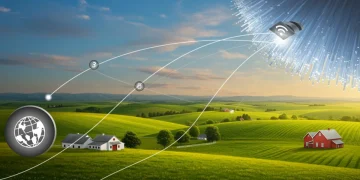5G technology: shaping the future of communication

5G technology enhances communication by providing faster speeds, lower latency, and improved connectivity, revolutionizing industries like healthcare, transportation, and entertainment while enabling smarter cities and advanced applications.
5G technology is not just a buzzword; it represents a significant leap in how we connect and communicate. With faster speeds and more reliable connections, it’s intriguing to think about how this could change our daily lives, isn’t it?
Understanding 5G technology
Understanding 5G technology is crucial for anyone interested in the future of communication. This new technology promises to transform how we connect, making our devices smarter and our interactions faster.
At its core, 5G is the fifth generation of mobile networks, which significantly improves speed and reliability compared to previous generations. But what exactly does that mean for everyday users? Let’s explore some of the key features of 5G technology.
Key Features of 5G
- Increased Speed: 5G can offer download speeds up to 100 times faster than 4G.
- Lower Latency: The delay in communication with 5G is significantly reduced, which is essential for real-time applications.
- Enhanced Connectivity: 5G supports a larger number of devices within the same area, ideal for smart cities.
- Improved Reliability: With better connections, users can expect more stable service, even in crowded areas.
The impact of 5G technology stretches beyond just faster phones. Industries from healthcare to transportation will rely on this technology for innovations. For instance, in healthcare, real-time data sharing can enable swift and informed medical decisions, potentially saving lives.
Moreover, as we drive towards a more interconnected world, the 5G technology landscape is evolving. Companies are investing heavily in infrastructure to support this capability, paving the way for future advancements like autonomous vehicles and advanced IoT devices.
Challenges Ahead
Despite its potential, the transition to 5G comes with challenges. Infrastructure costs can be high, and there is a need for wider coverage to ensure accessibility. Additionally, as with any technology, privacy and security concerns must be addressed to protect users.
Benefits of 5G for consumers
The benefits of 5G for consumers are significant and wide-ranging. As this technology rolls out globally, users are experiencing a new level of connectivity that enhances their digital lives.
One major benefit is the incredible speed that 5G offers. With download speeds that can reach up to 10 Gbps, consumers can download entire movies in just seconds. This drastic improvement means less time waiting and more time enjoying content, whether it’s streaming videos or browsing the web.
Enhanced User Experience
With 5G, activities like gaming and video streaming become more enjoyable. The reduced latency means that online gaming will have near-instantaneous response times. Streaming services can also deliver higher quality content without buffering, making it a seamless experience.
- Improved Video Quality: Enjoy high-definition and even 4K streaming without interruptions.
- More Efficient Data Usage: With faster speeds, users spend less time on mobile data for large downloads.
- Stable Connections: Better connectivity leads to fewer dropped calls and more reliable internet access.
- Simultaneous Device Connections: Connect more devices without lag, perfect for smart homes.
Another exciting aspect of 5G technology is its ability to support smart devices. As homes become smarter, having a strong and stable connection is vital. 5G facilitates the integration of smart appliances and the Internet of Things (IoT), making life easier and more efficient.
Consumers will also feel the impact of enhanced AR (Augmented Reality) and VR (Virtual Reality) experiences. With 5G, these technologies can operate smoothly, allowing for applications in education, entertainment, and training that were not possible before.
How 5G is changing industries

5G technology is dramatically changing industries and reshaping how businesses operate. Its impact is being felt across various sectors, bringing improvements and innovations that were not possible before.
In the field of healthcare, 5G is leading the way for telemedicine. With faster speeds and lower latency, doctors can diagnose and treat patients remotely. This is crucial in emergencies where every second counts. Patients can receive better care without the constraints of distance.
Transforming Transportation
The transportation industry is also experiencing a revolution due to 5G. Connected vehicles can communicate with each other to eliminate accidents and improve traffic flow. This level of communication makes roads safer and more efficient for everyone.
- Autonomous Vehicles: 5G supports the data exchange necessary for self-driving cars to operate safely.
- Smart Logistics: Companies can track shipments in real time, resulting in better inventory management.
- Improved Public Transport: Systems can optimize routes based on current conditions.
- Vehicle-to-Everything Communication: Vehicles can inform traffic systems, pedestrians, and each other about potential hazards.
The manufacturing sector benefits from 5G through the adoption of smart factories. These facilities utilize connected machines that share data in real time, which allows for predictive maintenance. This means equipment can be monitored closely, and issues can be addressed before they escalate into serious problems.
Moreover, 5G opens new doors in the field of entertainment and media. It enables streaming of high-quality content to multiple devices without interruption. This ability to deliver ultra-high-definition content fuels the rise of augmented reality (AR) and virtual reality (VR) experiences, making them more immersive and accessible.
As 5G continues to develop, its influence will expand further, driving innovation and efficiency. Companies that embrace this technology will likely lead their respective industries into the future.
Challenges in 5G implementation
Despite the numerous advantages of 5G technology, there are significant challenges in its implementation that cannot be overlooked. Addressing these challenges is essential for the successful deployment of this revolutionary network.
One of the primary challenges is the high cost associated with building the necessary infrastructure. Telecommunication companies must invest heavily in new hardware and software to support 5G capabilities. This includes installing new cell towers and upgrading existing ones to handle the increased data load.
Regulatory Hurdles
Regulatory issues also play a major role in the slow rollout of 5G. In many regions, obtaining the necessary permits and licenses can take time. Local governments may have different policies and regulations that can hinder progress.
- Permitting Process: The process to gain permission to install new towers can be lengthy and complicated.
- Safety Regulations: Compliance with health and safety standards is essential, which can delay installation.
- Public Engagement: Community concerns about infrastructure can lead to opposition, further delaying projects.
- Spectrum Allocation: Efficient use of the available radio frequencies is critical for successful deployment.
Another challenge is ensuring widespread coverage. While urban areas may see rapid implementation, rural regions often lag behind. Building infrastructure in these areas can be costly and may not generate immediate returns. Many consumers in less populated areas remain disconnected as a result.
Additionally, there are technical challenges that will need to be resolved. 5G is designed to connect a vast number of devices, and managing these connections requires advanced technologies. This presents hurdles in maintaining speed and reliability across the network.
Finally, there are ongoing concerns about privacy and security. As more devices become connected through 5G, users worry about their personal information being compromised. Ensuring data protection and security will be paramount as the network grows.
The future of communication with 5G
The future of communication with 5G holds exciting possibilities that can transform not only how we interact but also how industries operate. As this technology continues to evolve, we can expect significant changes in connectivity.
One of the most anticipated advancements is enhanced mobile broadband, which will support more devices at once. This means that users can enjoy seamless gaming, high-definition streaming, and enhanced virtual reality experiences without lag. Imagine watching your favorite movie in ultra-high definition while your smart home devices communicate effectively, all without interruption.
Smart Cities and IoT Integration
5G is set to power the next generation of smart cities. With its ability to connect numerous devices, it will enhance urban living. Traffic systems will become smarter, adapting to real-time conditions, and public services will improve.
- Efficient Public Transport: 5G can provide real-time updates, helping commuters plan their journeys better.
- Smart Energy Management: Buildings will use energy more efficiently, reducing costs and environmental impact.
- Enhanced Surveillance: Cities will implement advanced security systems that operate effectively across devices.
- Connected Health Services: With 5G, telehealth services will become more reliable, ensuring better patient outcomes.
Additionally, businesses will see improvements in productivity and efficiency. The implementation of 5G technology facilitates smoother workflows, allowing companies to thrive in a competitive market. From remote work to better supply chain management, 5G is set to redefine how businesses operate.
Moreover, innovations in entertainment and media are on the horizon. Consumers will access immersive experiences through augmented reality and interactive content. This shift will create new opportunities for brands and content creators.
As we embrace the 5G era, challenges will arise. However, the potential benefits are enormous. The landscape of daily communication, business processes, and overall connectivity is set to change, enabling a new wave of digital transformation.
In conclusion, the advancements brought by 5G technology are set to reshape our world in profound ways. This new communication standard enhances speed, reliability, and connectivity, impacting various aspects of our daily lives. From empowering smarter cities to revolutionizing healthcare and entertainment, 5G opens up exciting opportunities. As industries adapt to these changes, the future looks bright. However, we must also address the challenges of deployment and security to fully realize the potential of this transformative technology.
FAQ – Frequently Asked Questions about 5G Technology
What are the main benefits of 5G technology?
5G technology offers faster speeds, lower latency, and the ability to connect more devices simultaneously, improving overall connectivity.
How will 5G impact healthcare?
5G will enhance telehealth services, allowing for remote patient monitoring and faster medical responses, ultimately leading to better patient care.
What challenges does 5G implementation face?
5G implementation faces challenges such as high infrastructure costs, regulatory hurdles, and concerns regarding security and privacy.
How will 5G influence smart cities?
5G will enable smarter city systems by improving traffic management, public transport efficiency, and utility services, leading to better urban living.





